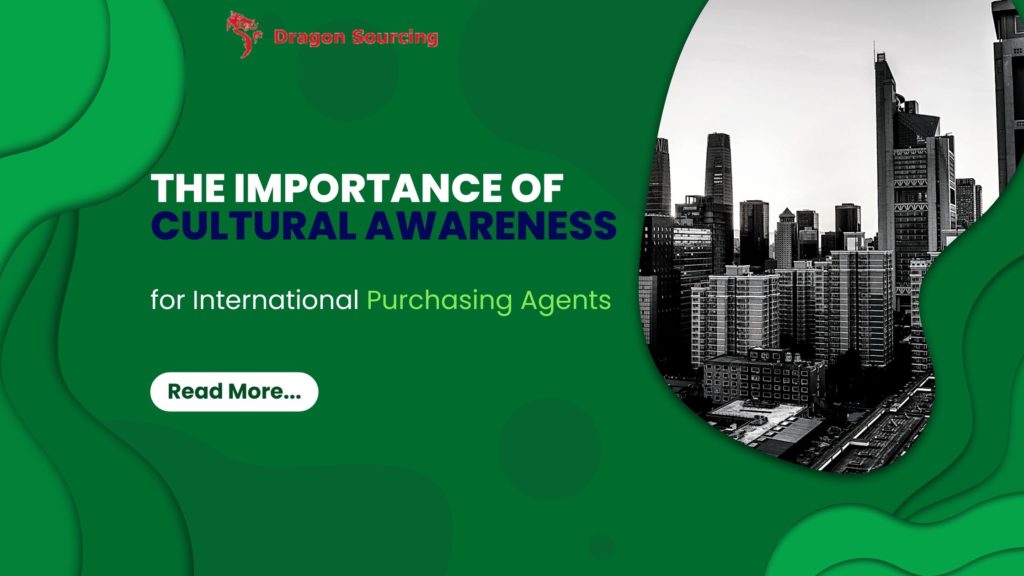
In today’s interconnected global market, purchasing agents frequently engage in cross-border operations—negotiating contracts, sourcing goods, and collaborating with suppliers from diverse cultural backgrounds. While expertise in procurement processes and technical skills remains crucial, cultural awareness has become equally important. A lack of cultural understanding can lead to communication breakdowns, weakened supplier relationships, and potentially expensive errors.
What is Cultural Awareness?
Cultural awareness is the understanding and appreciation of the differences and similarities between cultures. It involves recognizing how cultural factors such as communication styles, business etiquette, negotiation tactics, and time orientation influence decision-making and interpersonal relationships.
For international purchasing agents, cultural awareness extends beyond mere respect — it’s a strategic advantage that facilitates smoother transactions, builds trust with suppliers, and ensures long-term partnerships.
Why Cultural Awareness Matters in International Procurement
1. Enhancing Communication and Negotiations
In international procurement, communication is not just about language — it’s about context. A purchasing agent from the U.S. might prefer direct communication, while a supplier from Japan may value indirectness and reading between the lines. Misreading these cues can lead to misunderstandings.
Example: During a negotiation, a Chinese supplier might say “We’ll consider it,” which can be interpreted as a soft “no” rather than genuine interest. A culturally aware purchasing agent would recognize this and adjust their negotiation strategy accordingly.
2. Building Stronger Supplier Relationships
Long-term supplier relationships are built on trust, respect, and mutual understanding. Purchasing agents who invest time in understanding local customs and values demonstrate commitment, which suppliers appreciate.
Real-World Insight: In Latin American countries, business is often relationship-driven. Rushing into contracts without first establishing rapport can be viewed as disrespectful. Spending time over informal meetings or dinners can strengthen the business relationship.
3. Avoiding Costly Mistakes
Cultural missteps can delay shipments, void contracts, or even damage reputations. Simple gestures — like presenting business cards improperly in Japan or not understanding religious holidays in the Middle East — can lead to unintended offense or logistical challenges.
Expert Tip: Use a cultural calendar and familiarize yourself with key holidays in supplier countries to avoid placing orders or scheduling meetings during national or religious observances.
4. Improving Team Collaboration Across Borders
Larger organizations often involve multicultural procurement teams. A culturally aware purchasing agent can navigate team dynamics more effectively, contributing to smoother collaboration and shared goals.
Example: A German team member may prioritize efficiency and punctuality, while an Indian team member might adopt a more flexible approach to timelines. Understanding these preferences helps in aligning expectations and maintaining harmony.
Key Cultural Factors Purchasing Agents Should Consider
Here are some cultural dimensions that purchasing agents should familiarize themselves with, based on Geert Hofstede’s cultural dimensions theory:
| Dimension | Implication for Purchasing Agents |
|---|---|
| Power Distance | Understand how hierarchical a culture is. In high power distance countries, decisions are made top-down. |
| Individualism vs. Collectivism | In collectivist cultures, group consensus is critical. Individual decisions may be frowned upon. |
| Uncertainty Avoidance | Some cultures are risk-averse and prefer detailed contracts and clear terms. |
| Long-Term Orientation | Affects how suppliers plan and prioritize partnerships. |
| Communication Style | Some cultures prefer high-context communication (subtle and implicit), while others are low-context (explicit and direct). |
Cultural Awareness in Practice: Case Studies
Case Study 1: US Purchasing Agent Working with Chinese Suppliers
An American purchasing agent tried to rush a deal to meet quarter-end goals. However, the Chinese supplier felt disrespected by the lack of relationship-building and declined the contract. After being coached on Chinese business etiquette, the agent invested time in understanding the supplier’s values, resulting in a better long-term deal.
Case Study 2: German Purchasing Team Working with Middle Eastern Vendors
A German company faced repeated delays in order fulfillment from a Middle Eastern supplier. Upon investigation, they learned that cultural norms around time and holidays were not factored into their planning. By adjusting timelines and respecting local customs, on-time delivery improved significantly.
How to Develop Cultural Awareness as a Purchasing Agent
1. Invest in Cultural Training
Many organizations offer cross-cultural training programs. These help purchasing agents understand how to navigate cultural nuances in communication, business etiquette, and decision-making.
2. Research Local Business Customs
Before engaging with suppliers from a new region, take time to research their customs, etiquette, and taboos. Government trade websites, international chambers of commerce, and books like “Kiss, Bow, or Shake Hands” are great starting points.
3. Use Local Intermediaries or Consultants
Hiring a local agent or consultant can help bridge cultural gaps, especially in countries with complex regulatory or cultural frameworks.
4. Practice Empathy and Active Listening
Cultivating empathy allows purchasing agents to listen more attentively and interpret responses within a cultural framework. This builds rapport and trust.
5. Learn Basic Language Skills
Even learning a few words or phrases in a supplier’s native language can demonstrate respect and openness, which can go a long way in relationship-building.
The Business Case for Cultural Awareness
Cultural awareness isn’t just about being polite — it’s a competitive differentiator. Organizations with culturally adept purchasing teams benefit in multiple ways:
-
Fewer miscommunications and conflicts
-
Better vendor compliance and collaboration
-
Increased supplier loyalty and trust
-
More favorable pricing and contract terms
-
Reduced risk of legal or reputational issues
In an era where global sourcing is common and supplier diversity is prioritized, being culturally competent can improve not only operational efficiency but also corporate reputation.
Final Thoughts
In global procurement, cultural awareness is no longer optional — it’s essential. International purchasing agents are ambassadors of their companies, and their ability to navigate cultural differences directly impacts supply chain success. By investing in cultural intelligence, organizations can unlock new levels of supplier engagement, cost-effectiveness, and innovation.
As global supply chains become increasingly complex and interconnected, the purchasing agents who thrive will not only be skilled negotiators and analysts but also culturally agile professionals capable of leading with empathy and insight.
Author’s Note:
This article is based on years of experience in global procurement, interactions with multicultural supplier networks, and insights from cultural experts and procurement leaders. All examples are anonymized and simplified for clarity.



